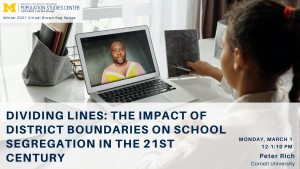Presented By: Institute for Social Research
Dividing Lines: The Impact Of District Boundaries On School Segregation In The 21st Century
Peter Rich (Cornell University)

Contact PSC Office for Zoom details.
Nationwide, nearly 13,000 school districts manage the delivery of public education to their local communities. Commute distance calculations reveal, however, that “local community” is an imprecise construct. Eight percent of all elementary school-aged are unable to attend the school closest to their home because it is located outside of their locally zoned residential school district. The spatial discontinuities produced by school district boundaries not only increase school commute times, but in some cases exacerbate school segregation. This occurs most often in areas where small, suburban school districts encircle large, citywide school districts. Decades of household sorting have created stark economic and social differences between some bordering school districts—generating a patchwork of territorial school district "fiefdoms." This talk presents preliminary findings from a counterfactual analysis. The estimates measure how much the enforcement of district boundaries over the present-day residential distribution of children contributes to public school segregation by race and poverty. The findings build from a novel method estimating access to public schools that incorporates the local school choice context for virtually every block in the U.S. The hidden costs of school district boundaries are revealed as a trade-off against the perceived benefits of local community control of schools and situated more broadly in a sociological perspective of state power over residential and school choice markets.
BIO:
Peter Rich is an Assistant Professor of Policy Analysis and Management and Sociology at Cornell University. His research investigates the connection between segregation, inequality, individual choice, and public policy in the United States, asking how sorting processes reflect and reinforce racial and socioeconomic gaps in educational attainment, wealth accumulation, and economic opportunity.
Population Studies Center (PSC) Brown Bag seminars highlight recent research in population studies and serve as a focal point for building our research community.
Contact PSC Office for Zoom details.
Nationwide, nearly 13,000 school districts manage the delivery of public education to their local communities. Commute distance calculations reveal, however, that “local community” is an imprecise construct. Eight percent of all elementary school-aged are unable to attend the school closest to their home because it is located outside of their locally zoned residential school district. The spatial discontinuities produced by school district boundaries not only increase school commute times, but in some cases exacerbate school segregation. This occurs most often in areas where small, suburban school districts encircle large, citywide school districts. Decades of household sorting have created stark economic and social differences between some bordering school districts—generating a patchwork of territorial school district "fiefdoms." This talk presents preliminary findings from a counterfactual analysis. The estimates measure how much the enforcement of district boundaries over the present-day residential distribution of children contributes to public school segregation by race and poverty. The findings build from a novel method estimating access to public schools that incorporates the local school choice context for virtually every block in the U.S. The hidden costs of school district boundaries are revealed as a trade-off against the perceived benefits of local community control of schools and situated more broadly in a sociological perspective of state power over residential and school choice markets.
BIO:
Peter Rich is an Assistant Professor of Policy Analysis and Management and Sociology at Cornell University. His research investigates the connection between segregation, inequality, individual choice, and public policy in the United States, asking how sorting processes reflect and reinforce racial and socioeconomic gaps in educational attainment, wealth accumulation, and economic opportunity.
Population Studies Center (PSC) Brown Bag seminars highlight recent research in population studies and serve as a focal point for building our research community.
Contact PSC Office for Zoom details.